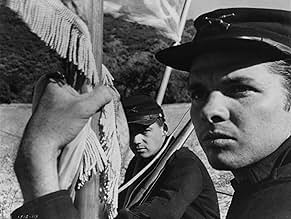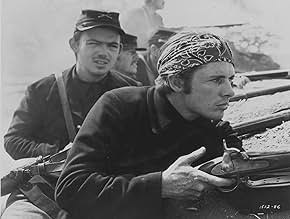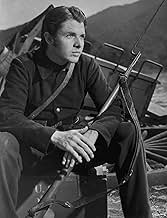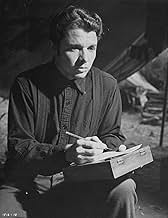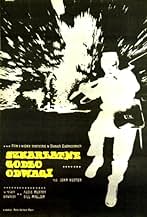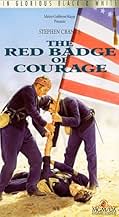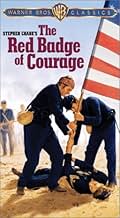CALIFICACIÓN DE IMDb
7.1/10
5.2 k
TU CALIFICACIÓN
Un joven recluta norteamericano se enfrenta al horror de la guerra de Secesión, debatiéndose entre sus ganas de luchar y las dudas sobre su propio coraje.Un joven recluta norteamericano se enfrenta al horror de la guerra de Secesión, debatiéndose entre sus ganas de luchar y las dudas sobre su propio coraje.Un joven recluta norteamericano se enfrenta al horror de la guerra de Secesión, debatiéndose entre sus ganas de luchar y las dudas sobre su propio coraje.
- Dirección
- Guionistas
- Elenco
- Nominada a1 premio BAFTA
- 2 premios ganados y 1 nominación en total
Robert Easton
- Thompson
- (as Robert Easton Burke)
Don Anderson
- Soldier
- (sin créditos)
Smith Ballew
- Union Captain
- (sin créditos)
Albert Band
- Union Soldier Fording River
- (sin créditos)
Gregg Barton
- Soldier
- (sin créditos)
Whit Bissell
- Wounded Officer
- (sin créditos)
Robert Board
- Soldier
- (sin créditos)
Chet Brandenburg
- Wounded Soldier
- (sin créditos)
Edwin Breen
- Confederate Flag Bearer
- (sin créditos)
Joe Brown Jr.
- Soldier
- (sin créditos)
- Dirección
- Guionistas
- Todo el elenco y el equipo
- Producción, taquilla y más en IMDbPro
Opiniones destacadas
Such a darn shame so much of the film was lost during a power struggle at MGM. What remains is a strong drama adapted from the Crane novel. Some call it an anti-war film, but that's a stretch since Audie Murphy's youthful soldier proves himself in battle after a cowardly initiation, and receives the admiration of his buddies. The sequence is more like a rite of passage than a denunciation.
The somewhat amateur cast is outstanding. I expect the untrained Murphy felt a personal commitment to his role and comes through just as professionally as he did in real life. Untrained cartoonist Bill Mauldin also looks and acts the part of callow youth maturing under pressures of life or death situations. His big ears are especially persuasive for a Hollywood setting.
And what burst of inspiration led the normally glamor-obsessed Tiffany of Studios to cast such affecting unlovelies as John Dierkes and Royal Dano in key parts. It's Dierkes's ill-fated salt-of-the-earth soldier that injects real tragedy into the sparse dialogue. With his craggy face and towering body he's every inch the early American primitive. And, of course, there's Dano with his gaunt face, wasted body, and graveyard voice, who helps make that line of wounded soldiers (the real core of the film) an unforgettable procession. Nor should that genuine face of war, the battle-shocked soldier deliriously bellowing The Battle Hymn of the Republic as he trudges along, be overlooked. And for a little humorous relief, who can forget the general whose pep-talk to each unit sounds like a broken record with a big stomach, but whose humanity shines through anyway.
The sweeping battlefields are effective in their look and feel, even if it is the scrublands of SoCal in the distance. Note all the dust and smoke obscuring vision, along with the chaotic criss-crossing of other units going here and there, but we don't know where. The effect is that of focusing our concerns on the familiar faces rather than on who's winning or losing the battle, which, I gather, is the way most infantry experience battle. It's been called understandably "the fog of war".
I like the brief lyrical moments that remind us of a larger world outside the stage of human conflict. Actually, Murphy is quite good at portraying sensitivity, as for example when he turns away from the raucous byplay at the farm house. The quiet moments with him and Mauldin are rather touching in that they look like two average Joe's showing the personal side of war. But, as Murphy proved in both the movie and real life, you never know the depths that may be concealed under that ordinary appearance.
I believe it was critic Andrew Sarris who pointed out that John Huston's career was never the same after MGM got through editing out an hour of his version and throwing the rest away. Now we can only guess how many other affecting scenes were tossed out in the process. Obviously, the project was close to Huston's heart being an adaptation of a great American novel from its most wrenching national conflict. I don't know whether to be happy or sad that this severely truncated version was finally marketed. It's good, but then there's the promise of so much more. Too bad the production didn't migrate to a less image-conscious studio.
The somewhat amateur cast is outstanding. I expect the untrained Murphy felt a personal commitment to his role and comes through just as professionally as he did in real life. Untrained cartoonist Bill Mauldin also looks and acts the part of callow youth maturing under pressures of life or death situations. His big ears are especially persuasive for a Hollywood setting.
And what burst of inspiration led the normally glamor-obsessed Tiffany of Studios to cast such affecting unlovelies as John Dierkes and Royal Dano in key parts. It's Dierkes's ill-fated salt-of-the-earth soldier that injects real tragedy into the sparse dialogue. With his craggy face and towering body he's every inch the early American primitive. And, of course, there's Dano with his gaunt face, wasted body, and graveyard voice, who helps make that line of wounded soldiers (the real core of the film) an unforgettable procession. Nor should that genuine face of war, the battle-shocked soldier deliriously bellowing The Battle Hymn of the Republic as he trudges along, be overlooked. And for a little humorous relief, who can forget the general whose pep-talk to each unit sounds like a broken record with a big stomach, but whose humanity shines through anyway.
The sweeping battlefields are effective in their look and feel, even if it is the scrublands of SoCal in the distance. Note all the dust and smoke obscuring vision, along with the chaotic criss-crossing of other units going here and there, but we don't know where. The effect is that of focusing our concerns on the familiar faces rather than on who's winning or losing the battle, which, I gather, is the way most infantry experience battle. It's been called understandably "the fog of war".
I like the brief lyrical moments that remind us of a larger world outside the stage of human conflict. Actually, Murphy is quite good at portraying sensitivity, as for example when he turns away from the raucous byplay at the farm house. The quiet moments with him and Mauldin are rather touching in that they look like two average Joe's showing the personal side of war. But, as Murphy proved in both the movie and real life, you never know the depths that may be concealed under that ordinary appearance.
I believe it was critic Andrew Sarris who pointed out that John Huston's career was never the same after MGM got through editing out an hour of his version and throwing the rest away. Now we can only guess how many other affecting scenes were tossed out in the process. Obviously, the project was close to Huston's heart being an adaptation of a great American novel from its most wrenching national conflict. I don't know whether to be happy or sad that this severely truncated version was finally marketed. It's good, but then there's the promise of so much more. Too bad the production didn't migrate to a less image-conscious studio.
This is really a very fine film and after seeing it on has to wonder why Audie Murphy never had more substantial roles in his career, as he was quite good in this film. As was mentioned in a previous post he was playing himself in the movie To Hell and Back and was essentially a B-Western actor the remainder of his career. This films shows that he was much more talented than one would ever know from watching the bulk of his films.
The original cut of THE RED BADGE OF COURAGE has never been seen--and probably does not exist--but this is the truncated version of the John Huston film and it's still powerful stuff.
It's an examination of courage among men under intense fire--such as the infantry men in the Civil War, about whom writer Stephen Crane wrote with almost poetical finesse. So that some of Crane's writing is maintained on screen, we get a narration by James Whitmore that succeeds in helping us understand the central character (AUDIE MURPHY) and his motivations.
Judging from photographs of the Civil War, the film has a gritty, realistic look as it goes from battle to battle with a group of men we get to know and recognize as vulnerable human beings caught in the tragedy of impossible battle situations.
AUDIE MURPHY is not noted for being an actor capable of deep characterization, but he's been guided by Huston to give a very effective, deeply felt performance, no doubt helped by the fact that he's been in the midst of battle before (he's a real life war hero), and must know the inner conflicts that face any man in battle.
The supporting cast of actors are fine, especially BILL MAULDIN as Audie's friend, both of them confessing moments of cowardice during battle fatigue and then able to go on with their mission.
But the real credit has to go to John Huston for writing and directing a film that he was never especially proud of, but which is stunningly photographed and directed with great skill.
It's an examination of courage among men under intense fire--such as the infantry men in the Civil War, about whom writer Stephen Crane wrote with almost poetical finesse. So that some of Crane's writing is maintained on screen, we get a narration by James Whitmore that succeeds in helping us understand the central character (AUDIE MURPHY) and his motivations.
Judging from photographs of the Civil War, the film has a gritty, realistic look as it goes from battle to battle with a group of men we get to know and recognize as vulnerable human beings caught in the tragedy of impossible battle situations.
AUDIE MURPHY is not noted for being an actor capable of deep characterization, but he's been guided by Huston to give a very effective, deeply felt performance, no doubt helped by the fact that he's been in the midst of battle before (he's a real life war hero), and must know the inner conflicts that face any man in battle.
The supporting cast of actors are fine, especially BILL MAULDIN as Audie's friend, both of them confessing moments of cowardice during battle fatigue and then able to go on with their mission.
But the real credit has to go to John Huston for writing and directing a film that he was never especially proud of, but which is stunningly photographed and directed with great skill.
Those who think Audie Murphy was not a very good actor haven't seen him in this film. Perhaps some of his later Western films didn't give him as much to work with, but in Red Badge of Courage he shines. Just a few of many great scenes which come to mind: early in the film when he hears that his group will finally be going into action, he writes a letter to his pa 'in case you are told that I have fallen', and you can see the remains of tears drying on his face; later on when his friend Jim dies after the first real battle, in Murphy's reaction you can see how wrenching it is for him to realize the human cost of war. Bill Mauldin, the famous cartoonist, plays the role of Murphy's closest friend in his fighting group, and does a superb job as well. Both Murphy and Mauldin seem perfectly suited to the age of their characters. While they were not originally actors by trade and had little if any acting experience, their performances in this film should shame many of today's 'actors' who draw multi million dollar paychecks and whose 'work' pales in comparison to that of Murphy and Mauldin in this film.
My only real disappointment was that due to massive editing the film is only 69 minutes long! I figured it was at the midway point when 'the end' came on the screen. Apparently this film became a sort of political football within the studio when it was made, yet I can't understand how anyone could justify cutting it down to this length. I was thoroughly enjoying this film all the way through and was nowhere near ready for it to end. Even so, even if you're not a Civil War buff, this is an excellent film with very engaging performances. It's more about the people than it is the war. Highly recommended.
My only real disappointment was that due to massive editing the film is only 69 minutes long! I figured it was at the midway point when 'the end' came on the screen. Apparently this film became a sort of political football within the studio when it was made, yet I can't understand how anyone could justify cutting it down to this length. I was thoroughly enjoying this film all the way through and was nowhere near ready for it to end. Even so, even if you're not a Civil War buff, this is an excellent film with very engaging performances. It's more about the people than it is the war. Highly recommended.
This movie, directed by John Huston, is arguably the finest Civil War movie of all time. The performances by the young Audie Murphy,America's most decorated soldier and all the cast are as true to life as can be found anywhere. The narration and ultra-realism gives an almost docu-drama feel. This movie is so short,at 69 minutes, that it never had a chance at the box office, and instead was probably seen mostly by school kids and a few old movie buffs. The only other movie that is almost as short and so successfully tells a story is "The Petrified Forest". The Red Badge of Courage is on my best movies of all time list.
¿Sabías que…?
- TriviaAfter seeing what MGM had done to the film, John Huston instructed his agent to include a clause in all future contracts guaranteeing that he would receive a copy of his director's cut on all of his films.
- ErroresAll the soldiers in Audie's infantry outfit have crossed rifles on their forage hats. The crossed rifle insignia was not adopted by the US army until the year 1876, before this it was a hunter's horn.
- Citas
The General: Howdy Jim, Corporal. How are those wounds?
Soldier: Stinging some, General, but they're a-mending.
The General: That's fine, fine. Anybody care for a chaw?
- ConexionesEdited into Hollywood: The Dream Factory (1972)
Selecciones populares
Inicia sesión para calificar y agrega a la lista de videos para obtener recomendaciones personalizadas
- How long is The Red Badge of Courage?Con tecnología de Alexa
Detalles
Taquilla
- Presupuesto
- USD 1,640,000 (estimado)
- Tiempo de ejecución1 hora 9 minutos
- Color
- Relación de aspecto
- 1.37 : 1
Contribuir a esta página
Sugiere una edición o agrega el contenido que falta

Principales brechas de datos
By what name was Alma de valiente (1951) officially released in India in English?
Responda

